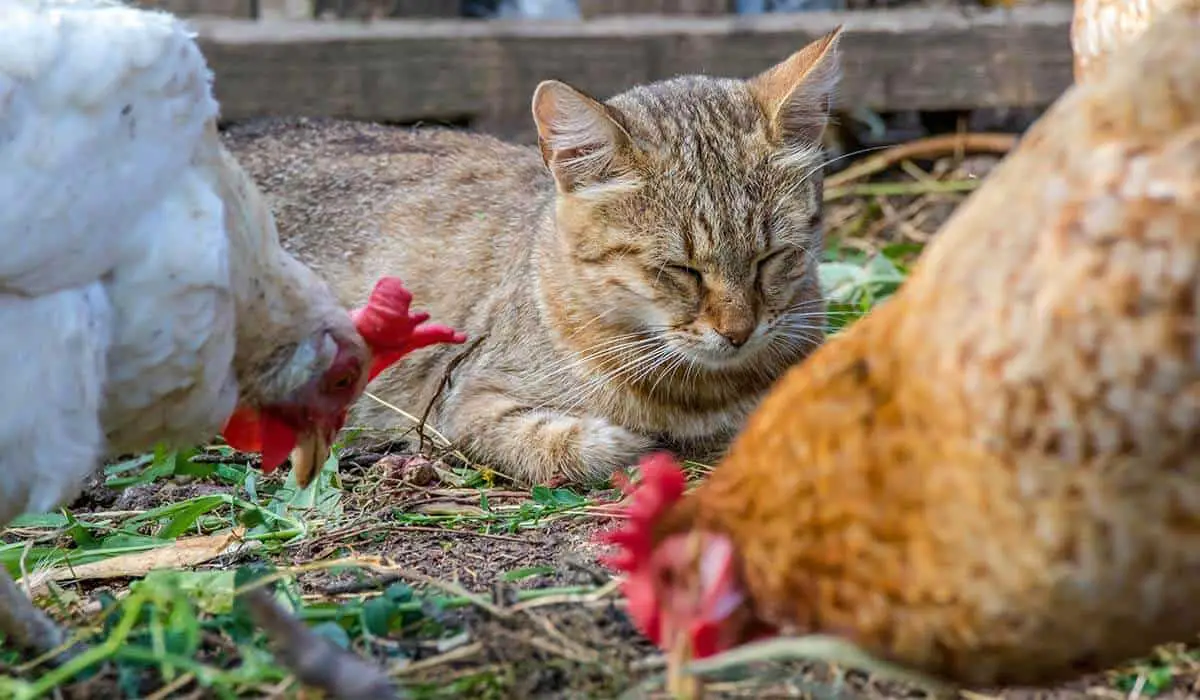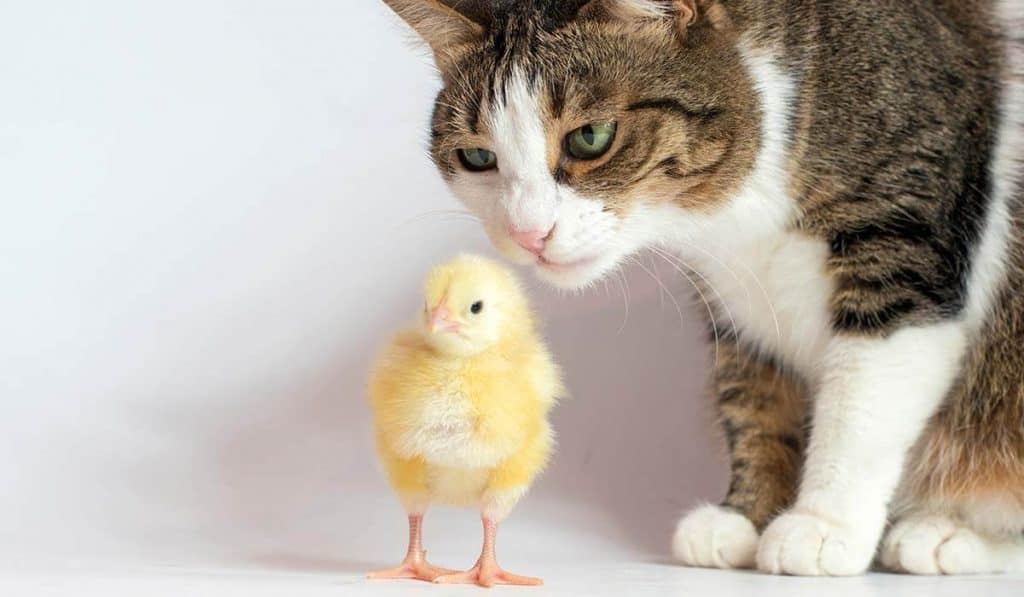Because cats are carnivorous predators, its normal for new chicken parents to wonder if their precious kitty will stray outdoors and attack laying hens. But is your household cat really that dangerous? While it’s true that cats hunt birds, your chickens are not likely on the menu.
Do House Cats Get Along With Chickens? Most cats will not harm a chicken when they are beyond 2-3 months of age. Older chickens can protect themselves against cats (think toenails, beaks, and spurs), plus there are several chickens against one cat.
The biggest issue comes when you are raising baby chicks. Many cats will show more interest in the smaller ones as they are bite-sized morsels that look irresistible.

Whether you have a cat or your neighbor has one, every chicken owner should what to expect. Before we look at the different types of cats roaming around you neighborhood, you first need to understand the natural instincts of felines.
Natural Instincts of Cats
Cats are carnivorous animals with a natural instinct to hunt. You’ve probably experienced it when your cat has scared the crap out of you when she pops out of nowhere and attacks your feet and legs.
Maybe your domesticated cat has wandered out the doggie door only to return with a mouse that is still alive? My cat has brought me a live mouse, because their proud of their catch.
Do Cats Kill Chickens?
According to this study, domesticated pets (cats included) will kill billions of wildlife each year. The study shows that both domesticated and feral cats have contributed to 33(14%) of the modern bird and reptile extinctions.
While it’s possible for a house cat to take down a full grown chicken, your biggest concern should be feral cats and wildcats.
Are Cats A Danger To Chickens?

Surprisingly, cats will not (usually) kill chickens. There are plenty of other predators you should watch for such as foxes, raccoons, coyotes, hawks, and etc.
However, just because your well-trained kitty doesn’t hurt your chickens, it doesn’t necessarily mean that your neighbors cat won’t kill them.
Let’s take a look at the different types of cats and whether or not they would likely attack your flock.
Household Cats
These cats are domesticated and usually very friendly. Many of them live indoors and may spend some time outdoors, while others stay indoors 24/7. Household cats that are properly cared for will usually leave your flock alone.
Feral Cats
These cats are scared of people and can be quite vicious. Unlike domesticated cats, feral cats are opportunistic feeders. They will eat whatever food is easiest for them to hunt.
If a feral cat happened upon your flock of chickens, there’s a good chance they would attack and kill one.
Stray Cats
A stray cat is most likely a domesticated pet that got lost or was abandoned. Unlike a feral cat, these cats have been socialized to people at some point in their life, and has been dependent on humans for food.
Both feral and stray cats will hunt to kill in order to eat properly. Free ranging cats are known to kill 100 or more mammals and birds each year. (source)
While they won’t usually hunt adult chickens, if you have a slower chicken, or one that hangs out by themselves, there’s a good chance they will attack it.
Do Cats Eat Chickens?
Most cats won’t be able to eat a full grown chicken, as they are too big and may scare a cat. However, if they encounter a slower chicken that strays away from the rest of the flock, it is possible that they will attack, kill, and eat them.
Like all prey animals, cats prefer easy prey. They will be more likely to kill young chicks that can’t protect themselves.
Not all cats will kill chickens, in fact, it’s possible to have your cat get along with your backyard chickens.
Do Cats Get Along With Chickens?
Despite their natural hunting instinct, cats rarely attack older adult chickens. The reason being, is a full grown chicken is similar in size to your household cat.
Cats generally like to hunt for prey that is easy and they don’t see as a threat. Given the reason they prefer hunting for smaller birds at bird feeders.
Most domesticated household cats are not looking for food, as they are usually well-fed. Instead, they are looking for ways to stay entertained, given the reason why some cats will chase the chickens for pleasure and joy.
Yes, there are stories of hens being killed by a cat, it’s not normal. Likely, that incidence was by a feral or stray cat that was desperate for food.
Cats understand that it’s a lot harder to take down a full grown hen, or rooster. Trying to kill a mature chicken will be a lot more challenging than taking down a small bird at the feeder or a small mouse.
They may try once, but after failing to do so, or getting chased by the chickens, they likely won’t do it again. In fact, your cat may not even enter the kennel again, if they happen to get pecked by the flock.
If you have free ranging chickens, your cat may be tempted to chase them around the yard.
What About Baby Chicks?
There are plenty of stories online, where a household cat has killed or hurt baby chicks. A one day old chick is about 4cm and 3 cm wide, which makes them easy prey for cats.
Even if your cat doesn’t have bad intentions, they will likely chase them around in hopes of playing with them. This playful action can easily kill the babies. Cats have sharp claws and teeth that can puncture a chick, which can cause death.
It’s best to keep your cat away from young chicks that are not old enough to be around the adults.
Are Chickens Afraid of Cats?
If your chickens have never seen a cat (baby chicks) there’s a good chance they will be scared of them. It also depends on your cats size, whether or not they are making noise, and the level of aggression of your cat.
A younger cat will likely scare chickens more than an adult laid back cat. Younger cats are more playful and may see chickens as toys and chase them around the kennel. They may not see the chickens as prey, but as amusement.
You should never let your cat chase your chickens. They should be introduced slowly to your chickens to ensure that both will get along.
If your cat chases the chickens, this can scare them and cause the chickens to be terrified whenever they see the cat approach their kennel.
Can Chickens Defend Themselves Against Cats?
Unlike other animals that can fight, and look to you for protection. Chickens will run or fly to get away from predators. If you haven’t clipped their wings, they will usually fly into a tree to get away from predators.
This doesn’t mean that chickens can’t protect themselves. I’ve personally seen a flock of chickens chase a cat that comes into their kennel. There are stories everywhere online where chicken owners have shared stories of their chickens chasing a cat or other predators.
Get A Rooster
Roosters are territorial of their flock, and will protect them from predators by sounding the alarm when something is wrong. This will give your hens enough time to run for cover.
While they won’t be able to fight off a coyote or fox, they may chase the cat to protect its hens.
That being said, you should take steps to protect your chickens from cats, and other animals that would prey on your flock.
Final Word
Cats won’t usually harm full grown chickens. If you have baby chicks, you should keep them away from your cat until they are old enough to interact with the other chickens.
Even if you don’t think your cat will harm your chickens, you should introduce them properly so you don’t wake up one morning with dead chickens or an injured cat.
Related Articles
